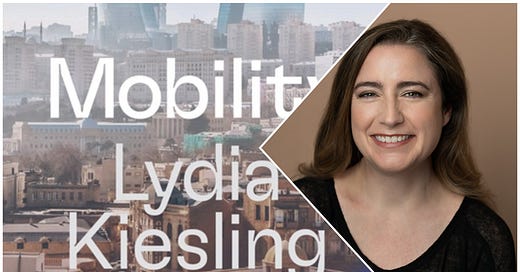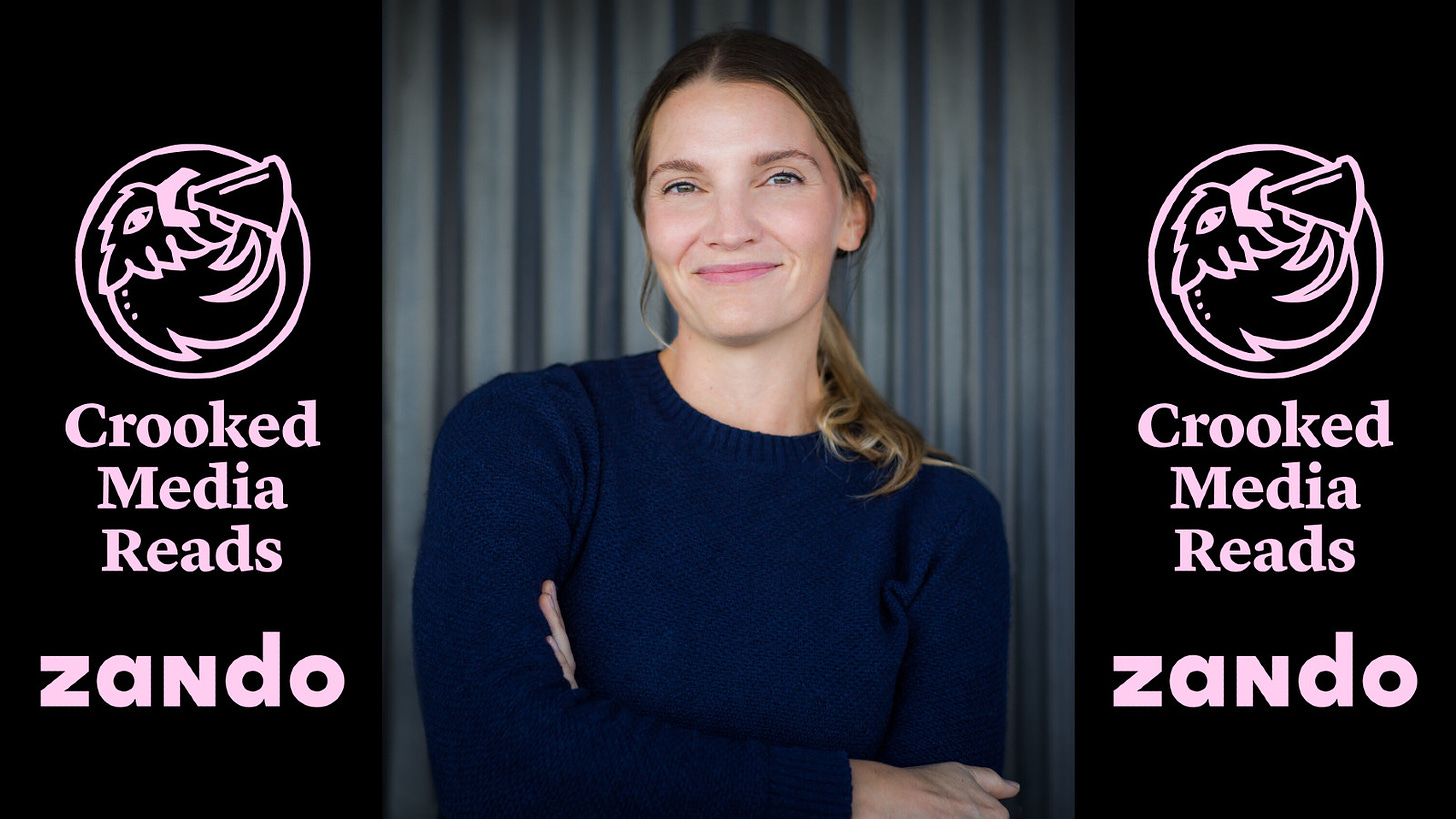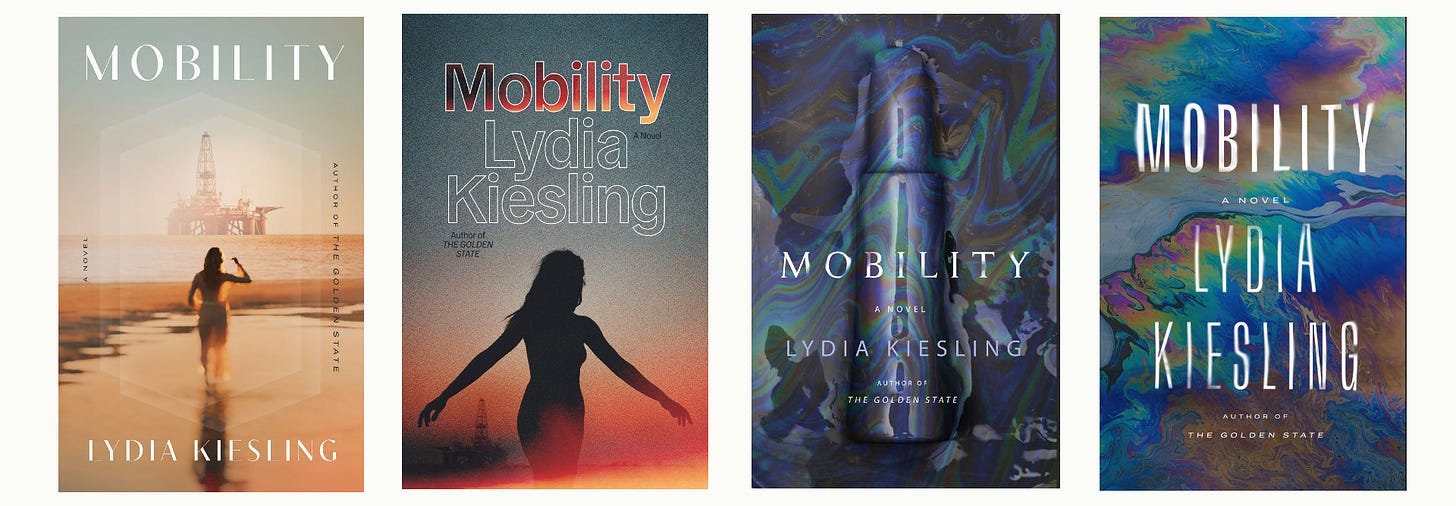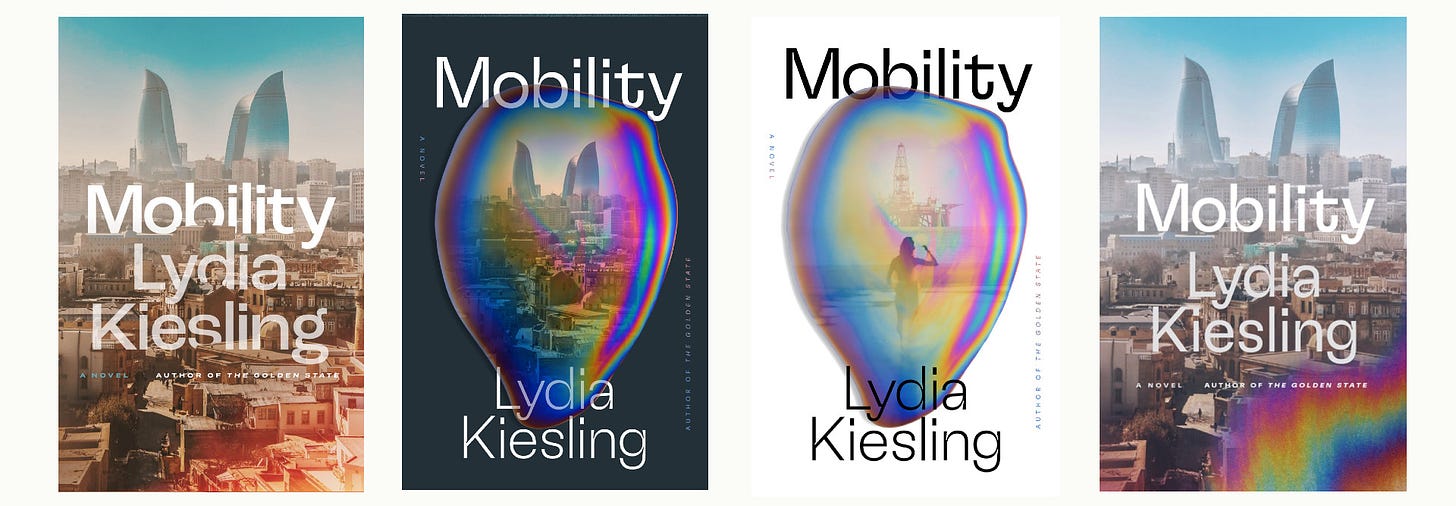Behind the book: Lydia Kiesling's USA TODAY bestseller
"I love books that are difficult to pitch." Inside the making of 2023's biggest climate crisis novel.
One of my favorite novels this year is Mobility, Lydia Kiesling’s cerebral follow-up to 2018’s brilliant The Golden State.
It opens in 1998 (one of the years I’m culturally obsessed with, alongside ‘97 and ‘99) when a 15-year-old American named Bunny Glenn spends the summer in Baku, Azerbaijan, thanks to her father, a roaming diplomat.
Years later, despite her progressive values, she finds ways to morally justify a succesful career in the oil industry. “It’s an urgent cri de coeur that asks us to consider what, if anything, we are willing to sacrifice to ensure the continued existence of a habitable world,” Michael Schaub wrote in his review at Alta. “Where does self-care end and stewardship of the future begin?”
I’ve loved Kiesling’s writing for a long time, so I was thrilled to speak with her, her editor at Zando Emily Bell, and her cover designer Evan Gaffney.
Lydia Kiesling, author
When and how did Mobility begin for you?
I started writing in 2017, just a few days and a few hundred words or here. The image I started with was two American siblings, high-school aged, flying alone from boarding school to their father’s overseas posting of Baku. I had been thinking about my own childhood in the Foreign Service and remembering the surreality of those transitions to and from places. But as an adult I now have new context for that kind of work, and America’s role in the world.
What was your research process like?
I read voraciously and widely. I read a lot of books about oil and gas, sometimes ending up with just one (very important) idea or sentence from each! Often the most helpful ones were the memoirs of geologists and engineers, often self-published, because they were so detailed about the work involved, the personalities, and the relationships, often in a pretty unguarded way. I read about a broader topics too, to an extent that much of the research didn’t make it into the book. I read a lot about consulting companies and a lot about the so-called War on Terror.
What was the most difficult thing about writing this book?
Understanding the scope of the oil complex was very difficult, and like Bunny I still don’t totally understand it. Our financial structures are so intimately connected with oil and gas, in ways that do not always make sense in a cause-and-effect way, and the history is also very deep.
Eventually I came to terms with not being able to somehow become an Engineer or Geologist or Economist of Oil Scholar just by researching a novel. I let the information flow through me in a way that I could use it while giving myself permission to not be an expert.
Emily Bell, editor
What drew you to Mobility and to Lydia's writing in general?
I love books that are difficult to pitch—books that when someone says, “what’s it about?” I have to ask, “how much time do you have?” Lydia’s writing—and her characters and the worlds she builds—are doing so many things all at the same time. Her writing is multitasking. Which is so thoroughly modern. And she takes the politics of being a woman seriously. Her work is deeply intellectual but never dismissive. And she’s goddamn funny.
What made Mobility a great fit for Zando?
We felt MOBILITY—a coming of age novel in and around the oil and gas industry—would be a perfect fit for the Crooked Media Reads imprint at Zando because one of Crooked’s tenants is to explore where the personal and the political collide.
How did Mobility evolve during the editing process?
Lydia and I worked on letting the reader learn about oil and gas through Bunny’s eyes. Lydia did an enormous amount of research. But she had to figure out how all that knowledge could flow through Bunny. And Bunny’s befuddlement had to be a part of that. At times I had to convince Lydia that it was okay to let Bunny stumble, let her have her obstruse moments, let her leave important world events out. And that it doesn’t mean Lydia the writer doesn’t know exactly what was going on—she does! Always! Bunny is certainly not dumb. But she is pretty basic…most of the time. And she gets distracted by shiny things. So we had to let her be herself without caring how that reflected on us. And by us I mean Lydia. Apologies for over-identifying. Editors can do that.
Evan Gaffney, art director
In my initial presentation, I leaned into Bunny's preoccupation with her appearance, and with prescribed codes of feminine presentation. The masculine menace of oil rigs was used as a counterpoint. In addition, I explored the iridescence of spilled oil, highlighting sensual flow it has, despite its status as the world's most important commodity. Covering lipstick in oil was meant as a dare—how far could we go in merging the beauty industry and the oil industry?
But in the end, it was deemed too much of a liability to focus on Bunny—we were intent on not making this strictly a "women's read". In the end the skyline Baku won out, initially in a sepia tone, like a faded photograph. At the request of the author and our publishing partner Crooked, I stripped away the historical haze covering the image, to place it firmly in the present, but reintroduced the oil, that shimmers like eyeshadow as it seeps into every aspect of Bunny's life.
Next up in The Frontlist
My 15 most-anticipated books of October








